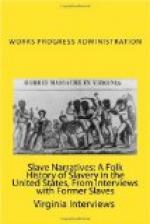It seemed to the child that he had just gone to bed when the old tallow candle was lighted and his ‘pappy’ arose and fell upon his knees and prayed aloud for God’s blessings and thanked him for another day. The field hands were to be in the field by five o’clock and it meant to rise before day, summer and winter. Not so bad in summer for it was soon day but in winter the weather was cold and darkness was longer passing away. When daylight came field hands had been working an hour or more. Robert Lee, Randall’s father was an overseer and it meant for him to be up and out with the rest of the men so he could see if things were going allright.
The Randall children were not forced up early because they did not eat breakfast with their ‘pappy’. Their mother was dining-room girl in her mistress’ house, so fed the children right from the Miller table. There was no objection offered to this.
Doctor Miller was kind but he did not want his slaves enlightened too much. Therefore, he did not allow much preaching in the church. They could have prayer meeting all they wanted to, but instructions from the Bible were thought dangerous for the slaves. He did not wish them to become too wise and get it into their heads to ran away and get free.
There was talk about freedom and Doctor Miller knew it would be only a matter of time when he would loose all his slaves. He said to Randall’s mother one day, “Delhia you’ll soon be as free as I am.” She said. “Sho’ nuf massy?” and he answered. “You sure will.” Nothing more was said to any of the slaves until Sherman’s army came through notifying the slaves they were free.
The presence of the soldiers caused such a comotion around the plantation that Randall’s mind was indelibly impressed with their doings.
The northern soldiers took all the food they could get their hands on and took possession of the cattle and horses and mules. Levi, the brother of Randall, and who was named after his paternal grandfather, was put on a mule and the mule loaded with provisions and sent two miles to the soldier’s camp. Levi liked that, for beside being well treated he received several pieces of money. The federal soldiers played with him and gave him all the food he wanted, although the Miller slaves and their children were fed and there was no reason for the child to be hungry.
Levi Lee, the grandfather of young Levi and Randall, had a dream while the soldiers were encamped round about the place. He dreamed that a pot of money was buried in a certain place; the person who showed it to him told him to go dig for it on the first rainy night. He kept the dream a secret and on the first rainy night he went, dug, and found the pot of money right where his dream had told him it would be. He took the pot of money to his cabin and told no one anything about it. He hid it as securely as possible, but when the soldiers were searching for gold and silver money they did not leave the Negro’s cabin out of the search. When they found the money they thought Levi’s master had given him the money to hide as they took it from him. Levi mourned a long time about the loss of his money and often told his grandchildren that he would have been well fixed when freedom came if he had not been robbed of his money.




